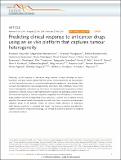Predicting clinical response to anticancer drugs using an ex vivo platform that captures tumour heterogeneity
Author(s)
Majumder, Biswanath; Baraneedharan, Ulaganathan; Thiyagarajan, Saravanan; Radhakrishnan, Padhma; Narasimhan, Harikrishna; Dhandapani, Muthu; Brijwani, Nilesh; Pinto, Dency D.; Prasath, Arun; Shanthappa, Basavaraja U.; Thayakumar, Allen; Surendran, Rajagopalan; Babu, Govind K.; Shenoy, Ashok M.; Kuriakose, Moni A.; Bergthold, Guillaume; Horowitz, Peleg; Loda, Massimo; Beroukhim, Rameen; Agarwal, Shivani; Sengupta, Shiladitya; Sundaram, Mallikarjun; Majumder, Pradip K.; ... Show more Show less
DownloadMajumder-2015-Predicting Clinical.pdf (2.664Mb)
PUBLISHER_CC
Publisher with Creative Commons License
Creative Commons Attribution
Terms of use
Metadata
Show full item recordAbstract
Predicting clinical response to anticancer drugs remains a major challenge in cancer treatment. Emerging reports indicate that the tumour microenvironment and heterogeneity can limit the predictive power of current biomarker-guided strategies for chemotherapy. Here we report the engineering of personalized tumour ecosystems that contextually conserve the tumour heterogeneity, and phenocopy the tumour microenvironment using tumour explants maintained in defined tumour grade-matched matrix support and autologous patient serum. The functional response of tumour ecosystems, engineered from 109 patients, to anticancer drugs, together with the corresponding clinical outcomes, is used to train a machine learning algorithm; the learned model is then applied to predict the clinical response in an independent validation group of 55 patients, where we achieve 100% sensitivity in predictions while keeping specificity in a desired high range. The tumour ecosystem and algorithm, together termed the CANScript technology, can emerge as a powerful platform for enabling personalized medicine.
Date issued
2015-02Department
Harvard University--MIT Division of Health Sciences and TechnologyJournal
Nature Communications
Publisher
Nature Publishing Group
Citation
Majumder, Biswanath, Ulaganathan Baraneedharan, Saravanan Thiyagarajan, Padhma Radhakrishnan, Harikrishna Narasimhan, Muthu Dhandapani, Nilesh Brijwani, et al. “Predicting Clinical Response to Anticancer Drugs Using an Ex Vivo Platform That Captures Tumour Heterogeneity.” Nature Communications 6 (February 27, 2015): 6169.
Version: Final published version
ISSN
2041-1723